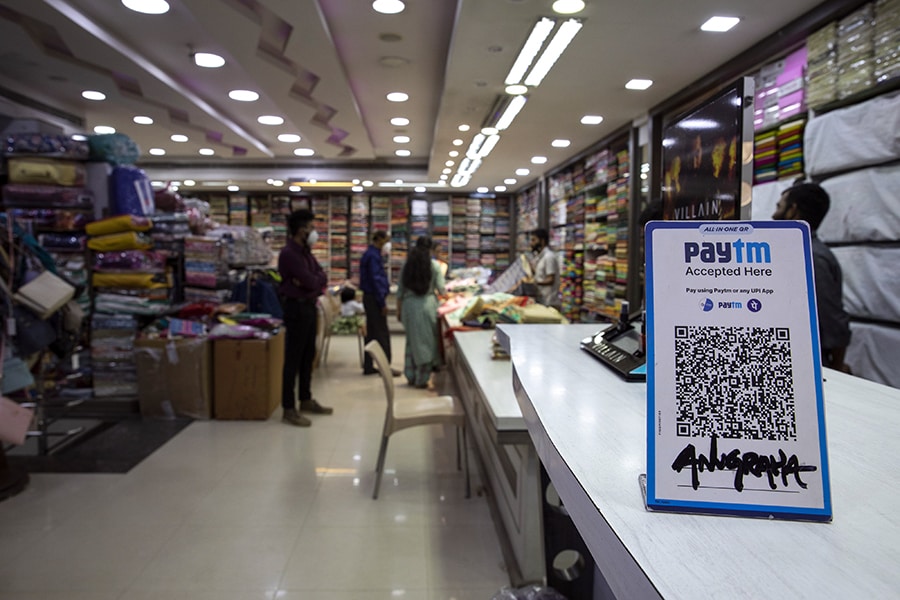Paytm Q1FY25: Quarterly losses widen, payments revenues slip
Fintech says full financial impact of disruptions to business seen. A rebound in merchant subscriptions and GMVs closer to January levels makes it upbeat of a recovery in growth and profitability
 Merchant subscription for Paytm was seen at 109 lakh for the June ended quarter, its investor presentation showed, a little above the December 2023 level of 106 lakh.
Imag: Samyukta Lakshmi/Bloomberg via Getty Images
Merchant subscription for Paytm was seen at 109 lakh for the June ended quarter, its investor presentation showed, a little above the December 2023 level of 106 lakh.
Imag: Samyukta Lakshmi/Bloomberg via Getty Images
One97 Communications Limited, which owns payments and financial services distribution company Paytm, is seeing the full financial impact of the disruptions to its business operations post the regulatory action earlier in 2024.
The company continued to see a widening of consolidated loss for the June-ended quarter to Rs 792 crore from Rs 549.6 crore for the sequential January to March 2024 quarter. Revenues slumped further to Rs 1,502 crore from Rs 2,267 crore for the same period.
Merchant subscription for Paytm was seen at 109 lakh for the June ended quarter, its investor presentation showed, a little above the December 2023 level of 106 lakh. “We are focusing on redeploying devices from inactive merchants to new merchants, resulting in a marginal increase in our merchant subscriber base. We expect net device merchant additions to reach previous run rates by Q3 FY 2025,” the company said in the presentation.
Daily average GMV—excluding the disrupted products—have also shown an improvement in the June quarter to Rs 4.3 lakh crore and nearing the March 2024 level of Rs 4.69 lakh crore.
The Paytm stock, on Friday, was up 3.39 percent to Rs 460 at the BSE, over its previous close. It has been down nearly 28 percent in calendar year 2024, but has recovered 45 percent from the recent low of Rs 317 on May 8.
The Paytm management has in recent months indicated the need to shift its focus towards secured loans and cross-selling of financial products, even as the payments bank activity has come to a near halt. Paytm has transitioned its core payments business from its subsidiary bank Paytm Payments India Ltd (PPBL) to four other banks (Axis Bank, HDFC Bank, SBI and Yes Bank).
This came after the regulator Reserve Bank of India, in February this year, accused the company of persistent non-compliances and continued material supervisory concerns in the bank, warranting further supervisory action.
In Q1FY25, payments and financial services revenue was down by 37 percent quarter-on-quarter to Rs 1,164 crore from Rs 1,858 in the March-ended quarter. This was due to the disruption of PPBL products and temporary impact on account of conservative approach taken for certain businesses; and temporary disruptions in operating metrics (MTU, merchant base, GMV).
Also read: More pain for Paytm till business model transition complete: Experts
The pure lending business also saw a decline in revenues. In Q1FY25, revenue from financial services and others fell 8 percent from the March quarter levels and 46 percent year-on-year to Rs 280 crore.
But the positive here is that about 50 percent of loans distributed are to repeat borrowers. Also, the average ticket size has increased to Rs 225,000 from Rs 190,000 a year ago, with an average tenure of 13 months.
The fintech said it will continue to focus on merchant payment innovations; reactivating existing dormant UPI customers and enhancing credit distribution by diversifying lending products and partners.
On the costs front, Paytm reiterated that its goal is to save Rs 400-500 crore each year on employee costs. It saw a 9 percent reduction in costs quarter-on-quarter. “However, excluding employee costs, our indirect costs have increased due to certain one-time expenses. We expect these costs to reduce in the coming quarters,” the statement said.
Paytm’s indirect costs rose to Rs 1,301 crore for the June ended quarter from Rs 1,220 crore a year earlier due to higher marketing costs and higher one-time software, cloud and data centre expenses.
One97 Communications has recently been given permission by NPCI to operate as a third party application provider (TPAP) and migrate its UPI-based payments business to other banks (now Axis Bank, HDFC Bank, SBI and Yes Bank) from PPBL.
Analysts however continue to be conservative in their outlook towards the growth trajectory for Paytm.
“The company is starting to see a bit of a rebound in some of the key metrics, from when the regulatory action was taken. But we have to see how these metrics, particularly GMVs and merchant onboarding, play out in coming quarters, before being certain about the recovery path,” an analyst at an equity research firm said, declining to be named.


















